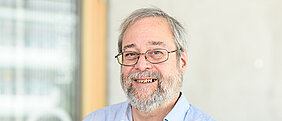Todd Marder elected Fellow of the European Academy of Sciences
08.07.2019Great honor for Todd Marder (Chair I of Inorganic Chemistry). He has been elected as Fellow of the European Academy of Sciences.
The European Academy of Sciences (EurASc) is a fully independent international association of distinguished scholars that aims to recognize and elect to its membership the best European scientists with a vision for Europe as a whole, transcending national borders, and with the aims of strengthening European science and scientific cooperation. Another objective is to take advantage of the expertise of its members in advising other European bodies for the betterment of European research, technological application and social development. It is completely independent from any national entity in its membership, election processes, deliberations and actions.
Todd Marder’s key research interests are organometallic chemistry, homogeneous catalysis, conjugated materials and their optical and electronic properties, and non-covalent interactions. (Details can be found on his website)
Due to his outstanding academic work, he has received many awards and prizes, and was previously elected Fellow of the AAAS (American Association for the Advancement of Science), Fellow of the Royal Society of Chemistry, UK (FRSC), and Member of the Bayerische Akademie der Wissenschaften (The Bavarian Academy of Sciences).
The European Academy of Sciences:
The European Academy of Sciences (EurASc) (Latin: Academia Scientiarum Europaea) is an international non-profit organization aiming to promote excellence in science and technology. Based in Brussels, Belgium, it has about 600 members, including 65 Nobel Prize and Fields Medal winners, from 45 countries. It was established on 17 December 2003.
Since 2004, the academy has published multidisciplinary annals, e-newsletters for science and technology and ,since 2009, various books. Its first general assemblies and ceremonies of awards were organized in Brussels and, since 2009, each year in another country (2009: Università di Bologna, Italy; 2010: Academy of Athens, Greece; 2011: Università di Milano, Italy; 2012: Université de Liège, Belgium; 2013: L.C.C de Toulouse, France; 2014: Casa do Infante, Porto, Portugal; 2015: Le Quartz Centre de Congrès Brest, France; 2016: Palais des Académies in Brussels, Belgium; 2017: Lisbon Academy of Sciences, Lisbon, Portugal; 2018: Bielefeld, Center for Interdisciplinary Research, Germany. Since 2012, the academy has also organized an annual symposium called The Future of Sciences in the 21st Century. More information can be found at www.eurasc.org. (source: Wikipedia)









